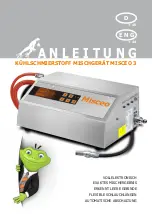
Page 22
7.
Total Dissolved Solids (TDS)
Adding salt to pool water will raise the TDS level. While this does not
adversely affect the pool water chemistry or clarity, the pool water professional testing for TDS must
be made aware salt has been added for the AquaPure system. The individual performing the TDS test
will then subtract the salinity level to arrive at the correct TDS level.
8. New Pool Water in a recently filled or newly refinished pool may contain undesirable matter. This
undesirable matter could interfere with the AquaPure’s ability to chlorinate properly. Make sure the
water is tested by a pool professional and properly balanced before turning on the AquaPure.
4.5 Optimum Pool Water Conditions
In accordance with National Spa and Pool Institute (NSPI) standards, we recommend the following water
balance conditions be maintained on an on-going basis to protect the pool finish and equipment and
ensure the pleasing appearance of the water. The AquaPure is warranted to operate properly only if these
conditions are met.
Free Chlorine
1.0 - 3.0 PPM. Above 3.0 PPM may cause corrosion of
pool metals.
Combined Chlorine (Chloramines)
None (Super Chlorinate to remove all Chloramines).
pH
7.2 - 7.8 (USE MURIATIC ACID to lower pH and Soda Ash
to raise pH).
Chlorine Stabilizer (Cyanuric Acid)
50 - 75 PPM
Total Alkalinity
80 - 120 PPM
Calcium Hardness
150 - 400 PPM
Metals (Copper, Iron, Manganese)
None
Nitrates
None
4.6 Chlorine Testing
It is recommended that chlorine test samples be taken from two places. Compare the samples. A higher
level should be found at the pool return line. The higher level at the pool return line indicates the AquaPure
is producing chlorine.
1. At the pool return line.
2. 18 inches (457 mm) below the surface and well away from the pool return line.
4.7 Salt (NaCl sodium chloride)
4.7.1 What Type of Salt to Use?
• The purer the salt the better the life and performance of the electrolytic cell. Use a salt that is at least
99.8% pure NaCl. The salt is an evaporated, granulated, food quality, non-iodized salt. Consult your salt
supplier.
• Avoid using salt with anti-caking agents (sodium ferrocyanide, also known as YPS or yellow prussiate
of soda) that could cause some discoloration of fittings and surface finishes in pool.
• Water conditioning salt pellets are compressed forms of evaporated salt and may be used but will take
longer to dissolve.
•
Do Not
use calcium chloride as a source of salt. (Use sodium chloride only).
•
Do Not
use Rock salt (insoluble impurities mixed with the rock salt can shorten the life of the unit).
















































